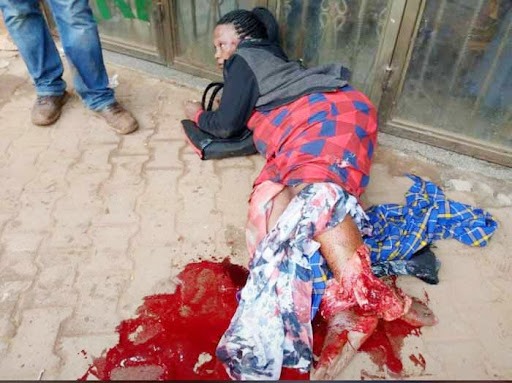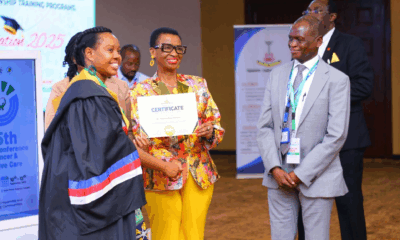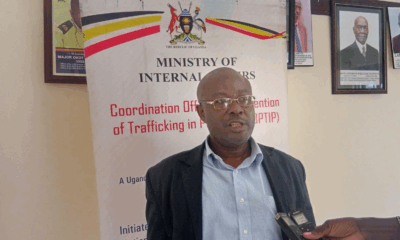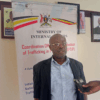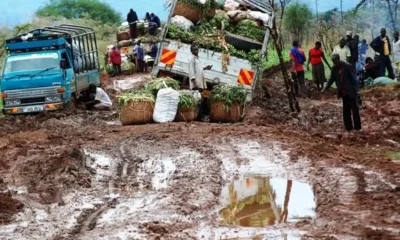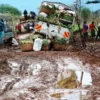Opinions
Shooting People Dead to ‘Save’ them from Dying of Covid-19
John Kitobe, 72, and Amos Ssegawa, 15, were victims of a bizarre political situation, two weeks ago. Both were shot dead in Kampala by either one of those – Police/Army/militia security agencies – as they were trying to exit from chaos that erupted following the arrest of presidential aspirant, Robert Kyagulanyi, a.k.a. Bobi Wine, 180 kms away in Luuka District, Iganga.
Kitobe, a retired Uganda Management Institute (UMI) academician, was shot while walking away, seeking safety, from the Mabirizi Plaza, in the middle of Kampala, amid the chaos. Ssegawa, was being led away by his mother from their Kisenyi shop to safety in their Massajja-Kikajo suburb abode, when he met his untimely death.
As they went by Usafi Market, gun-toting Police aboard a pick-up, firing into the crowd, hit Ssegawa in the mouth; he died almost instantly. Ssegawa had been helping his mother in the shop, since he was not in school, because his is not a candidate class, as he was absolved from attending classes because of the Covid-19 pandemic.
These two were among the dead; shot in Kampala by security forces in the interest of the Kyagulanyi crowd-control, in Luuka. The numbers of the dead have varied from 59 to over one hundred, with more than 600 bullet injuries. According to “some video clips widely shared on social media platforms the security operatives indiscriminately [shooting] live bullets at both protesters and bystanders.” In the aftermath, the National Unity Platform (NUP), adherents collected more than 1,000 bullet shells; an indication of a number of people that would have been killed, had all of them hit their targets.
The reason for this was ostensibly to effect the Covic-19 standard operating procedures (SOPs), especially of social-distancing, for the NUP rally in Luuka. It failed; causing the security to, instead, arrest Kyagulanyi, for causing the non-observance of SOPs.
Government has gone to great lengths to justify the deaths and injuries in its assiduousness to stop the riots. “If you threaten the lives of the security forces and the lives of the public, they have a right to shoot you…,” Security Minister, Gen. Elly Tumwine, explained later. This does not diminish from the Kitobe, Ssegawa and the innocent people’s misfortune, even though they ‘feared committing crime’, from being needlessly killed, but it indicates the callousness with which the security forces are all set to carry out orders to the detriment of the citizens.
Appearing on a Uganda Broadcasting Corporation’s “Behind the Headlines” show, Tumwine “congratulate[d] our security forces for what they have done, restoring peace and order for a premeditated plan to burn Kampala and destroy property.” He did not substantiate the claim of burning of the city.
The diplomatic circles were rankled. The United Nation, European Union and the United States, all criticized the “most significant human rights abuses which included unlawful killings.”
Yet, this is merely one of the latest of incidences, they have added to the description of “torture by security forces; harsh prison conditions; arbitrary detention; restrictions on freedoms of press, expression, assembly, and political participation….” as indicated in an 2018 report on human rights. The Foundation for Human Rights Initiative, Human Rights Watch, the Uganda Human Rights Commission (UHRC) and other non-governmental organizations have catalogued more than 7,500 human rights violations in a ten-year period.
At one point in 2019 it galled the-then president of Uganda Law Society (ULS), Simon Peter Kinobe, who inspired the Parliamentary Human Rights Committee (HRC) to institute a probe into the matter. Kinobe trained his sights on the Internal Security Organization (ISO), then-headed by the dreaded Col. Frank Bagyenda, a.k.a. Kaka. “Despite the lack of statutory mandate to arrest and detain, [ISO] has continually detained citizens in places un-gazetted by law…,” Kinobe had asserted.
Kaka denied carrying out illegal arrests and detentions in “safe houses”, but when HRC Chairperson, MP Janepher Nantume Egunyu, attempted to investigate the safe houses facilities in Kyengera, Nalukolongo, Nkokonjeru and Lwemayuba in Kalangala Islands, they were blocked by the Uganda Peoples Defense Forces (UPDF). Egunyu was aghast: “It’s unfortunate that we cannot be allowed to access [this facility] in an effort to exercise our mandate,” which “mandate”, was given by Parliamentary Speaker, Rebecca Kadaga.
That committee included MPs; Kyagulanyi, Kawempe North, Latif Ssebbagala and Arua Municipality, Kassiano Wadri, respectively. And it was as a result of the latter that the matter of Kyengera safe house came to public light. His constituent, a pregnant Jamila Asha Atim, a records clerk kidnapped from Arua Regional Referral Hospital, was traced to the Kyengera safe house; she had a miscarriage. Kassiano said: “Atim was being detained in a Kyengera safe house along Kampala-Masaka road” where other “people [have] undergone horrendous torture”.
The committee was horrified. Kadaga could nothing but summon Tumwine to explain the matter on the Floor of Parliament. He justified the existence of safe houses as a [secure] place used for intelligence work; and security agencies world over operate safe houses.” He was bolstered by Bagyenda who upheld this impunity as; “ISO is not taking over the role of the Police but we are providing support of ending [criminality] in Kampala and elsewhere.”
Elsewhere can mean up-country and can involve persons working in NGOs. It has happened to banning them, like notable ones, such as ActionAid; or insignificant ones like ACODA which had been operating in Katakwi and Amuria districts. In occasions in 2012 and 2018 the NGOs have been banned and by the latter date their presence was reduced to about 2,000 from a record high of more than 12, 000. This “criminality” can also involve effecting kidnappings of people working in these NGOs, or even other places.
A most publicized case was that of the New Vision crime reporter, Charles Etukuri in 2018. He was only relased after the High Court ordered ISO to produce him. ISO operatives had kidnapped him for writing about the death of a Finn at Pearl of Africa Hotel.
Some from the banned NGOs have not been so lucky, as it were. A number of ACODA workers have not been seen since they were held a considerable time ago. It is believed they may have been taken to the Kalangala Island’s Lwamayuba safe house. It is instructive that, it is here that Kaka is operating his Panoma Hotel, to which he has retreated to do business, after his dismissal from ISO.
szumuz@yahoo.com
Comments



